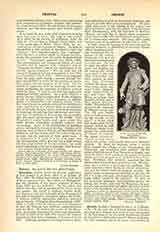

Frowin, BLESSED, Benedictine abbot, d. March 11, 1178. Of the early life of Frowin nothing is known, save that he is claimed as a monk of their community by the historians of the two great Benedictine abbeys of Einsiedeln in Switzerland and St. Blasius in Baden. The first authentic fact in his career is his election as abbot, about the year 1142, to succeed St. Adelhelm in the newly established monastery of Engelberg (q.v.) in the Canton of Unterwalden, Switzerland. As abbot Frowin was conspicuous for sanctity, learning, and administrative ability. Through his efforts the possessions and privileges, civil and ecclesiastical, of the abbey were greatly increased, while its renown as a home of learning, art, and piety spread far and wide. Himself a man of great intellectual endowments, thoroughly versed in all the science, sacred and profane, of his time, he established a famous school in his abbey, in which besides the trivium and quadrivium, philosophy and theology were likewise taught. The library which he collected possessed, for those days, a vast number of manuscripts. According to a list that he himself has left us, it contained Homer, Cicero, Cato, Ovid and other authors of antiquity. This rich collection perished in 1729, when the abbey was destroyed by fire. Blessed Frowin not only copied books for his library, but composed several. Two of these, a commentary on the Lord’s Prayer, and a treatise in seven books, “De Laude Liberi Arbitrii” (“In Praise of Free Will“, but in reality a discussion of the chief theological questions of his day, directed, it is thought, against the errors of Abelard) are still extant, having been discovered by Mabillon in the archives of Einsiedeln. Frowin’s other works, Commentaries on the Ten Commandments and various parts of Holy Scripture, are lost. Though never formally beatified, Frowin has commonly been styled “Blessed” by the chroniclers (see “Act. SS.”, March, IX, 683). Petin (“Dictionnaire Hagiographique”, I, iiii) gives March 7 as his feast day, and credits him with many miracles.
JOHN F.X. MURPHY

